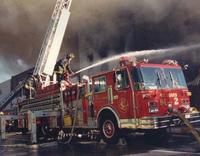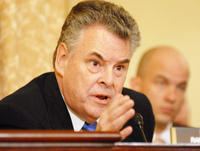-
How many people from terrorism-sponsoring states enter the U.S. illegally?
Senator John Cornyn (R-Texas) says the United States arrested people from nations designated as terrorism sponsors on the border with Mexico in the first nineteen months of Obama administration; an Austin newspaper investigated this claim and reached these conclusions: Cornyn is right that there were arrests of people from the four states designated by the United States as sponsoring terrorism (Cuba, Iran, Sudan, and Syria) — but: the number of people from these states arrested on the Mexican border is miniscule (0.02 percent of the 540,865 total arrests on the southwestern border in fiscal 2009); 87 percent of the people from these countries arrested while trying to enter the United States illegally do so through the Canadian border; and the numbers are dropping: there were 3,309 apprehensions of people from terrorism-sponsoring countries in 2005 (when Libya and North Korea were also on the list), 935 apprehensions in 2009, and 736 in fiscal 2010
-
-
DHS grant buys upgrades for MS police department's bomb squad
The local police department of Tupelo, Mississippi is spending $50,000 to bolster its bomb squad’s capabilities thanks to a grant from DHS; the grant was awarded to Tupelo’s Explosive Ordinance Disposal Team and will be used to buy new equipment as well as a bomb disposal robot; So far Tupelo’s bomb squad has responded to three calls regarding suspicious packages, which all turned out to be false alarms; Tupelo’s bomb squad will also benefit other local police departments in the area and police chiefs are grateful
-
-
Alabama proposes law enforcement technology fund
The Alabama State Legislature is currently considering a bill that proposes adding a $10 technology fee to court costs in Chilton County; the fee is aimed at offset the rising technology costs of local law enforcement agencies; local police departments are struggling to comply with state mandates that require local agencies to electronically file tickets and other reports; the state has not provided funding to help departments pay for the operation and maintenance of computer systems; if the fee had been in place last year, it would have generated approximately $90,000
-
-
DHS grant saves St. Louis firefighters' jobs

Thirty St. Louis, Missouri firefighters caught a break last week after the city received a $3.2 million grant from DHS; the city had planned on cutting their jobs, but the DHS grant will allow the firefighters to stay employed;the money comes as part of the Staffing for Adequate Fire and Emergency Response (SAFER) program which is aimed at helping local fire departments maintain adequate staffing levels; Federal Emergency Management Agency (FEMA) administers the grant and plans to allocate $420 million this year to fire departments across the country that have been hit by budget cuts
-
-
Water infrastructure budgets to see massive cuts in 2012
Next year water infrastructure projects and programs are expected to see massive budget cuts as President Obama has proposed slashing infrastructure spending at the Environmental Protection Agency (EPA) and the U.S. Army Corps of Engineers; the Drinking Water State Revolving Fund (SRF) will see nearly $400 million cuts and the Clean Water SRF will be cut nearly $600 million; according to Lisa Jackson, the EPA administrator, these cuts in SRF budgets reflect a return to a more “sustainable level”; states worry that cuts will make it difficult to fund future infrastructure upgrades; reports have shown that the United States faces a $500 billion shortfall for water infrastructure funding over the next twenty years
-
-
$200,000 grant for upstate N.Y. fire department

Last week the city of Tonawanda in western New York received nearly $200,000 from DHS to purchase new firefighting equipment; the money will be used to purchase harnesses, ropes, victim removal devices, enhanced air supply equipment, and a new communications system; funding comes from the DHS Assistance to Firefighters Grant Program; the grant comes at a critical time as the city is struggling with its budget; several local fire departments nearby also received grants last month including those in Rochester, Youngstown, and Ridge-Culver
-
-
Madison County, IL receives $260,000 in DHS grants
Two fire departments in Madison County, Illinois were recently awarded more than $260,000 in federal grants; the grants come as part of DHS’ Assistance to Firefighters program and goes toward the purchase of new safety gear and firefighting equipment; the Wood River fire department will receive $223,556 to help pay for a high-volume foam monitor as well as foam that will be used to put out chemical fires; the Rosewood Heights Fire Protection District will receive $37,050 to procure thirty sets of new protective fire suits
-
-
GAO scrutinizes DHS financial management system
The Government Accountability Office (GAO) has thrown a wrench in DHS’s long-running effort to modernize its financial management system, upholding a protest of the department’s most recent award; the decision could be significant for agencies reevaluating their IT programs in the wake of a slate of Office of Management and Budget (OMB) reviews launched last year
-
-
Audit finds DHS dramatically improved its acquisition process
A recent audit by the DHS Inspector General found that the department had dramatically improved its oversight of contracts and reduced the number of noncompetitive contracts awarded by 60 percent last year; in 2010 DHS awarded $1.3 billion in no compete contracts compared to $3.4 billion in 2009 and $3.5 billion in 2008; the inspector general reviewed forty noncompetitive contracts worth roughly $100 million dollars and found that the rate of deficiencies was only 7 percent; while the report found marked improvements, it also recognized that there were still gaps in DHS’ acquisition process
-
-
King blasts GOP for transportation security cuts

Representative Peter King (R - New York), the chairman of the House Homeland Security Committee, blasted the GOP’s plan to reduce the budget by $61 billion, citing cuts to critical anti-terror programs; the House plans to reduce spending on port security and transit facilities by $400 million, bringing total spending down to $200 million; local transit authorities say that losing federal funding would be detrimental as states and cities are struggling with their own budgets; the grants are designated for things like cameras, tunnel fortification, training, patrols, and canine teams at transport hubs and ports; proponents of the cuts believe that these programs are redundant, unnecessary, and lack sufficient oversight
-
-
DHS information officers discuss the future of technology at AFCEA
The senior technology officials of several DHS agencies gathered for a roundtable discussion at the AFCEA Homeland Security Conference in Washington, D.C. to outline their priorities, challenges, and plans for procuring technology and implementing capabilities at their respective departments; information officers from TSA, the U.S Coast Guard, the National Protection and Programs Directorate, and Citizen and Immigration Services were present; each official expressed similar plans to increase mobile access to data, digitize records, establish national databases, and streamline the flow of information; officials believe these remotely accessible databases can also help reduce costs and enhance customer service; the officials also noted the difficulty in hiring qualified personnel with cyber security skills
-
-
House Republicans slash funds for border security, immigration enforcement
House Republicans voted to slash spending for border security and immigration enforcement for the remainder of this fiscal year by an estimated $600 million; the House budget allocates $350 million less for border security fencing, infrastructure, and technology than Congress approved last year, and $124 million below what DHS requested; the bill also cuts an estimated $159 million over last year for Customs and Border Protection modernization and construction programs, and is $40 million less than the agency sought to get the job done
-
-
Critics: tough talk on border security not backed up with funds

Last August, with virtually unanimous bipartisan support, Congress increased border funding by $600 million, adding 1,000 new agents to the Border Patrol; Republicans complained this was not enough — citing a GAO report that said that by the Border Patrol’s own standards, the agency had “operational control” over only 873 miles of the 2,000-mile border with Mexico in 2010, or about 44 percent; Lamar Smith (R-Texas), chairman of the House Judiciary Committee, said administration officials “are either blissfully unaware of the massive holes in security along the Southern border or are intentionally misleading the American people”; trouble is, as part of their $60 billion in budget cuts, Republicans propose shrinking the Border Patrol by 870 agents and cut $272 million in funds for surveillance systems to monitor the border with Mexico
-
-
DHS requesting boost in cybersecurity funds
Government, industry, and academia have labeled the shortage of cyber specialists in the government as a national security problem; the United States is looking to hire 30,000 security experts to safeguard cyberspace as opposed to the 1,000 personnel currently staffed government wide; DHS has requested $936 million in funding for FY 2012 to grow the federal cybersecurity workforce and enhance network protections
-
-
New DHS budget includes more money for airport scanners
As lawmakers are trimming the budgets of many programs and agencies in an effort to reduce the deficit, funding for airport scanners has increased; overall discretionary funding for DHS has grown 0.7 percent to $43.2 billion, and includes more funding for full-body scanners; the Obama administration’s budget request allocates $77 million for the purchase of 275 additional full-body scanners; each scanner costs $280,000 and the additional order will bring the total number of scanners deployed at U.S. airports to 1,275; the Transportation Security Administration (TSA) has introduced new software that projects a non-gender specific image to ease concerns over privacy issues that sparked a backlash last year
-
More headlines
The long view
Foundation for U.S. Breakthroughs Feels Shakier to Researchers
By Max Larkin
With each dollar of its grants, the National Institutes of Health —the world’s largest funder of biomedical research —generates, on average, $2.56 worth of economic activity across all 50 states. NIH grants also support more than 400,000 U.S. jobs, and have been a central force in establishing the country’s dominance in medical research. Waves of funding cuts and grant terminations under the second Trump administration are a threat to the U.S. status as driver of scientific progress, and to the nation’s economy.
The True Cost of Abandoning Science
By Steven R. Furlanetto
“We now face a choice: to remain at the vanguard of scientific inquiry through sound investment, or to cede our leadership and watch others answer the big questions that have confounded humanity for millennia —and reap the rewards.”
